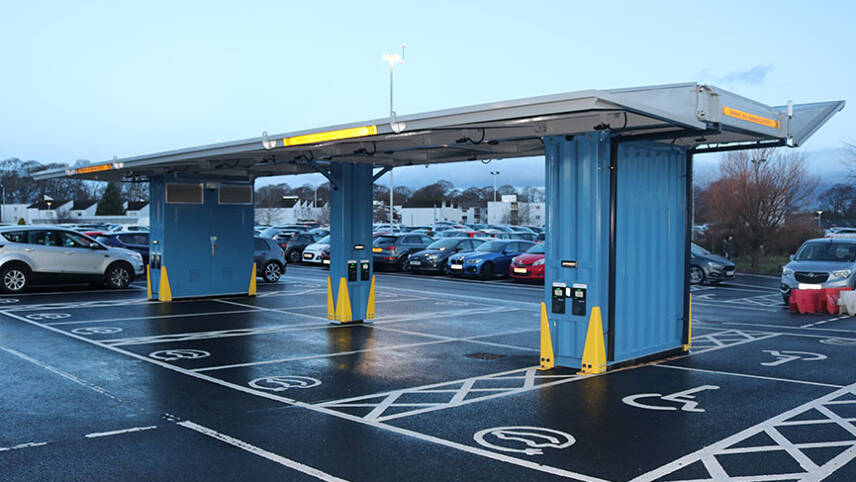This premium content is exclusive to edie Members.
To find out more about edie Membership, please click below.
If you are an existing member, login here

At a Glance
Who: NHS Scotland in collaboration with 3ti
What: Installation of a Papilio3 pop-up solar car park and EV charging hub
Where: Raigmore Hospital, Inverness, Scotland
Why: To provide convenient, sustainable EV charging solutions and reduce carbon emissions
When: February 2024
The challenge:
NHS faces a pressing challenge in reducing its carbon footprint, particularly in the transport sector, with transport accounting for approximately 14% of the NHS’s annual carbon footprint, including patient travel, business travel and staff commutes.
While Raigmore Hospital already has a fleet of electric vehicles (EVs) in operation, a lack of accessible and convenient EV charging infrastructure poses a challenge to promoting EV adoption among staff and visitors.
The solution:
3ti, a UK-based solar car park operator, introduces the Papilio3 pop-up solar car park and EV charging hub, utilising recycled shipping containers to integrate solar power with existing energy sources. This innovative solution offers fast and convenient charging for up to 12 EVs simultaneously, helping promote EV adoption in the area by providing affordable, low-carbon charging for everyone, regardless of access to off-street parking or geographic location.
How the project works:
The Papilio3 project leverages innovative design and technology to offer a sustainable solution for EV charging. Built from recycled shipping containers, Papilio3 can be swiftly installed in under eight hours, providing a flexible and scalable charging infrastructure. Its portability allows for deployment in remote or challenging locations.
Papilio3 integrates solar power with existing energy sources, boasting a solar capacity of 19.32 kilowatt-peak (kWp). This solar energy generation enables the Papilio3 unit to operate independently of the grid, reducing reliance on traditional power sources and promoting renewable energy adoption.
With an annual electricity generation of 18 megawatt-hours (MWh), Papilio3 contributes to environmental sustainability by offsetting carbon emissions equivalent to more than 63,000 miles of EV range.
The Papilio3 charging hub offers a range of technology-driven enhancements for users. Equipped with a back-office billing system, EV drivers can easily manage payments and transactions, ensuring efficient and transparent billing processes. Additionally, energy-saving motion sensors activate lighting upon customer approach, enhancing safety and convenience, while fully operational CCTV provides added security for users.
The results:
By offering fast and convenient charging for up to 12 EVs simultaneously, Papilio3 improves accessibility and convenience for hospital staff and visitors. The project supports the NHS’s commitment to reducing carbon emissions, contributing to its broader goal of achieving net-zero emissions by 2040.
Moreover, Papilio3’s rental contract model eliminates the need for upfront capital investment by customers, making it a cost-effective solution for sustainable EV charging infrastructure.
Business benefits:
The collaboration with 3ti brings multiple benefits to NHS Scotland, including enhanced sustainability, improved staff and visitor experience, and aligning with broader climate goals.
Investment/savings:
With an annual electricity generation of 18MWh, the Papilio3 unit offers savings in energy costs while promoting renewable energy usage. The rental contract model ensures affordability and a favorable return on investment for NHS Scotland.
Industry context:
Transport accounts for a significant portion of NHS Scotland’s carbon footprint, emphasising the importance of transitioning to zero-emission vehicles and improving charging infrastructure.
Additionally, the UK Government has launched its zero emissions vehicle (ZEV) mandate, requiring automakers to keep increasing the number of ZEVs they sell each year, in order to decarbonise the nation’s road transport.
Given Scotland’s commitment to achieving net-zero emissions by 2045, surpassing the UK’s target of reaching net-zero by 2050, there is a pressing need for accelerated efforts to decarbonise its transport sector.
© Faversham House Ltd 2024 edie news articles may be copied or forwarded for individual use only. No other reproduction or distribution is permitted without prior written consent.

